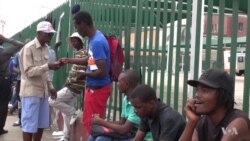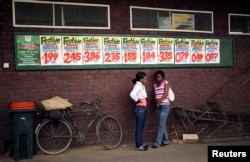Innocent Kagodora should not be here.
Since he graduated from the University of Zimbabwe in 2015, he has spent 14 hours a day on a rough Harare street corner, selling phones out of a backpack. He's an example of Zimbabwe’s soaring youth unemployment problem -- which many critics blame on former President Robert Mugabe.
His colleagues here call him Comrade Graduate. On a good day, he said, he takes home $10 -- not enough, he says, to help his widowed father.
“It hurts him to a lot to say he has a degree, my son is educated enough in Zimbabwe, but he can’t even afford to send me groceries at the end of the month," Kagodora said.
Zimbabwe has no shortage of energetic, educated young people, many of them college graduates like Innocent. But what the country lacks is jobs, and the pressure is on for the new government to turn the situation around quickly.
The recent swearing-in of President Emmerson Mnangagwa has given many young Zimbabweans a shot of hope. He has promised to improve the economy, and students say they plan to hold him to that promise. On the first full day of his presidency, student leaders met in the capital to strategize on mobilizing the youth vote for elections scheduled next year.
“We will basically be calling him to account in terms of the things he has promised. So every citizen, every young people awaits seeing these things getting into reality," said activist and student organizer Ostallos Siziba.
Some, like Kagodora, also want to see younger people in powerful positions.
“Let’s have technocrats, not just bootlickers of the regime, not bootlickers of the leadership who are being put in those positions," Kagodora said. "When we have those people, now, I think they can contribute significantly. So what we want now is to day, is we are encouraging our government now to say, Look at France now, it has one of the youngest leaders in the world. … So when you look at that what does it mean for our nation, I think it’s the realization that the youth are not the leaders of tomorrow, they are the leaders of today and tomorrow.”
At his alma mater, psychology major Nyasha Choga says she wants leaders to change their mentality and focus on the future, not the glories of the past.
“You listen to them, most of their speeches, they’re still talking about the liberation struggle," Choga noted. "I appreciate what they did, yes. But I think it’s time for them to move away from that now. The ideas, they are not fit for the world that we are in right now.”
And they worry about the youth coming behind them. Like 16-year-old Advocate Kambeu, who really shouldn’t be on a Harare street corner selling $11 shoes on a school day.
If he could afford school fees, he says, he could do big things.
“I want to do politics. I think I am talented in politics," Kambeu told VOA.
Mnangagwa has laid out an ambitious program of economic reform. And millions of energetic, talented young Zimbabweans -- like Innocent, Ostallos, Nyasha, Nadene and Advocate -- are counting on him to deliver.











